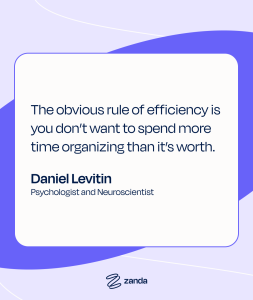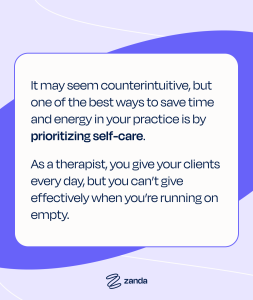Managing time in therapy private practice can feel like a constant juggling act. Between client sessions, admin work, and everything else that comes with running a business, it’s easy for even the most efficient therapists to feel stretched thin.
But being efficient isn’t just about getting through the day without dropping any balls; it’s about streamlining your operations to the point where you no longer feel like you’re juggling. It’s about implementing systems you can rely on to save time.
In this article, we’ll share three practical, easy-to-implement tips for therapists that can help you save time, reduce stress, and focus on growing a thriving business. Most importantly, though, they’re also quick to set up. In the words of psychologist and neuroscientist, Daniel Levitin, “The obvious rule of efficiency is you don’t want to spend more time organizing than it’s worth.”
Tip #1: Streamline Administrative Tasks
Administrative tasks can easily consume much of your day in private practice. Scheduling appointments, managing billing and invoicing, processing intake forms, and sending reminders might not seem like they’d take up a lot of time at first glance, but it adds up quickly. If left unchecked, these tasks can eat into the hours you could spend with clients or on nurturing your own well-being.
Missed appointments due to no-shows only add to the frustration, leaving unexpected gaps in your schedule that could have been filled with more notice. Fortunately, several tools and strategies exist to streamline these processes, allowing you to reclaim your time and reduce stress.
Here are a few ways to simplify your admin work:
- Online Booking: Encourage clients to schedule their appointments online. This eliminates the back-and-forth of emails or phone calls and lets clients book at their convenience.
- Automatic invoicing: Manually sending invoices can be tedious, especially when tracking payments. Set up an automatic invoicing system that generates and sends post-appointment invoices so you can focus on more important tasks without worrying about paperwork.
- Online payments: Accept online payments to speed up the billing process and reduce time spent following up on unpaid invoices.
- Online forms: Move your intake forms and other paperwork to an online practice management system. This allows clients to complete and submit forms before appointments, reducing your manual data entry and ensuring you have all the necessary information ahead of time.
- Automatic appointment reminders: No-shows are costly, both in terms of time and revenue. Set up automated appointment reminders via text or email to help ensure clients attend their sessions. This reduces the likelihood of missed appointments and saves you from sending manual reminders.
Tip #2: Use Templates for Efficient Clinical Notes and Letters
Invest a little time upfront to create well-organized templates and save yourself hours in the long run. It’s about reducing stress and building a workflow that supports both you and your clients.
Every therapist knows that preparation is key to providing high-quality care. Planning your sessions with templates helps you stay organized and focused, which allows you to be more fully engaged with clients.
As important as treatment planning is, writing clinical notes after each session can take time and may feel overwhelming.
Templates for clinical notes and letters are a simple yet highly effective solution. Instead of staring at a blank screen, create templates including fields like presenting issues, session goals, interventions, and client progress. These frameworks help you capture essential information while saving time on repetitive tasks. Templates can be especially useful if you follow structured formats like SOAP, which help you organize your thoughts and keep your notes consistent.
Tip #3: Prioritize Self-Care
It may seem counterintuitive, but one of the best ways to save time and energy in your practice is by prioritizing self-care. As a therapist, you give to your clients every day, but you can’t give effectively when you’re running on empty.
Your well-being affects everything from your ability to stay present during sessions to the energy you bring to each interaction.
Self-care directly impacts how productive and effective you are at work. When you’re mentally and emotionally grounded, you’re better equipped to handle the demands of a busy practice without becoming overwhelmed.
Here are a few ideas for your self-care routine:
- Incorporate mindfulness practices, like meditation, deep breathing exercises, or even short moments of reflection between sessions, to stay centered throughout the day. These small moments of mindfulness help you to reset, refocus, and approach each session with a clear mind.
- Prioritize tasks and build regular breaks into your schedule. Step away from your work periodically, even for a few minutes, to recharge and return with more focus and clarity. This is an often overlooked way of preventing burnout and giving your brain the rest it needs.
- Set firm boundaries to avoid compassion fatigue and reduce the risk of burnout. By saying “no” when needed and carving out time for yourself, you’ll protect your energy and ensure you can show up fully for your clients.
- Develop a realistic and healthy work-life balance to protect your sense of job satisfaction. When you nurture your own well-being, you become more productive during your workday. Taking care of yourself allows you to take better care of your clients and creates a positive cycle that enhances both your personal and professional life.
Conclusion
In private practice, time is one of your most valuable resources. If you streamline administrative tasks and use templates wherever possible, you’ll be well-equipped to reduce the time you spend on non-client-facing work and boost productivity.
Efficient tools and strategies enhance your workflow and free up time for self-care. When you maintain a balanced practice, you have more energy to devote to your sessions and to your life outside of work.
For more tips for therapists on managing your practice, improving your productivity, and cultivating a healthy work-life balance, be sure to visit the Productivity & Mindset section of our Practice Management Blog. Start small, try out one strategy at a time, and watch how a few simple changes can transform your day-to-day routine.
Ready to save time and streamline your practice? Try Zanda for FREE for 14 days and experience how easy it can be to manage your private practice efficiently.







